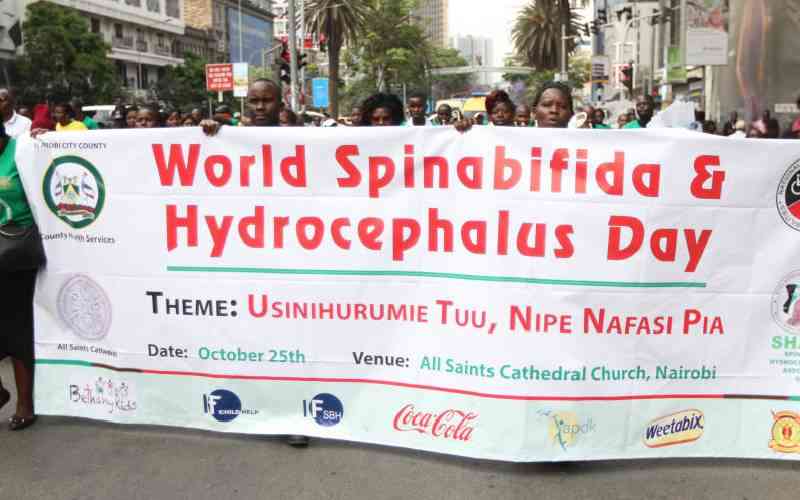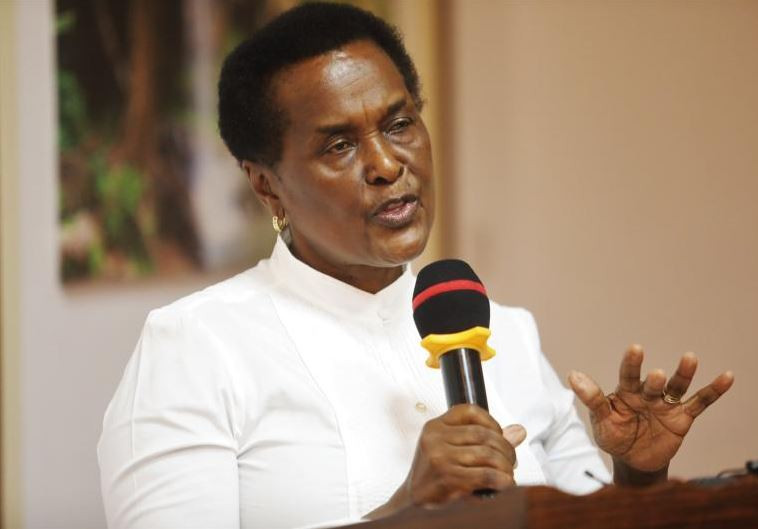
Participants march along Kenyatta Avenue, Nairobi, during celebrations to mark World Spinabifida Hydrocephalus Day. [File, Standard]]
Children born with excessive cerebrospinal fluid in the brain face many challenges, including delayed developmental milestones and stigma. Many parents are still unaware that early diagnosis and prompt treatment can improve outcomes for children with hydrocephalus.
Hydrocephalus is a condition where excessive cerebrospinal fluid builds up in the brain, causing pressure that can damage brain tissue. It affects more than 500,000 infants each year. Without early intervention, often surgery, hydrocephalus can be fatal, and survivors often face lifelong challenges.
Many communities wrongly view conditions like hydrocephalus as curses, leading to the stigmatisation of families with children with hydrocephalus. September is a time for communities to embrace and support people living with this condition, rather than discriminate or stigmatise them.
September 20th is World Hydrocephalus Awareness Day. This day is dedicated to raising awareness about hydrocephalus, one of the most common and serious neurosurgical conditions affecting children worldwide.
As we observe this significant day, it’s important to remind everyone that anyone, at any age, can develop hydrocephalus. It can result from severe head injuries, brain tumors, childbirth complications, or infections like meningitis.
Treatment includes shunt insertion and other alternative surgeries like endoscopic third ventriculostomy and choroid plexus cauterisation. Follow-up care is necessary after surgery to ensure the well-being of a child or an individual and to address any complications that may arise.
Some preventive measures include: Good maternal healthcare, safe delivery practices, and early childhood vaccinations are vital. Prompt treatment of infections can also prevent some cases of hydrocephalus.
Unwavering dedication
An important aspect of this awareness day is to also celebrate the resilience of those living with hydrocephalus and to acknowledge the unwavering dedication of caregivers and parents who continue to support their loved ones. These individuals navigate daily challenges with remarkable strength, and their perseverance deserves recognition.
This day also serves as a crucial reminder to our communities that help is readily available, and no one affected by hydrocephalus needs to feel isolated. Support networks, medical professionals, and advocacy groups are dedicated to providing resources and guidance.
Furthermore, World Hydrocephalus Day underscores the critical need for early diagnosis, ongoing treatment, and comprehensive management of this complex neurological condition.
With good support and proper management, which requires lifelong follow-up care, individuals with hydrocephalus can live long and fulfilling lives. This includes access to specialised medical care, therapies, and educational opportunities that empower them to reach their full potential.
By raising awareness and promoting understanding, we can foster a more inclusive and supportive environment for everyone affected by hydrocephalus. The day encourages advocacy for better research, improved treatments, and increased access to care globally, ensuring that all individuals living with hydrocephalus have the opportunity to thrive.
Ms Waithaka is the Communications Manager at BethanyKids Kenya and a social change advocate. [email protected]
Stay informed. Subscribe to our newsletter







